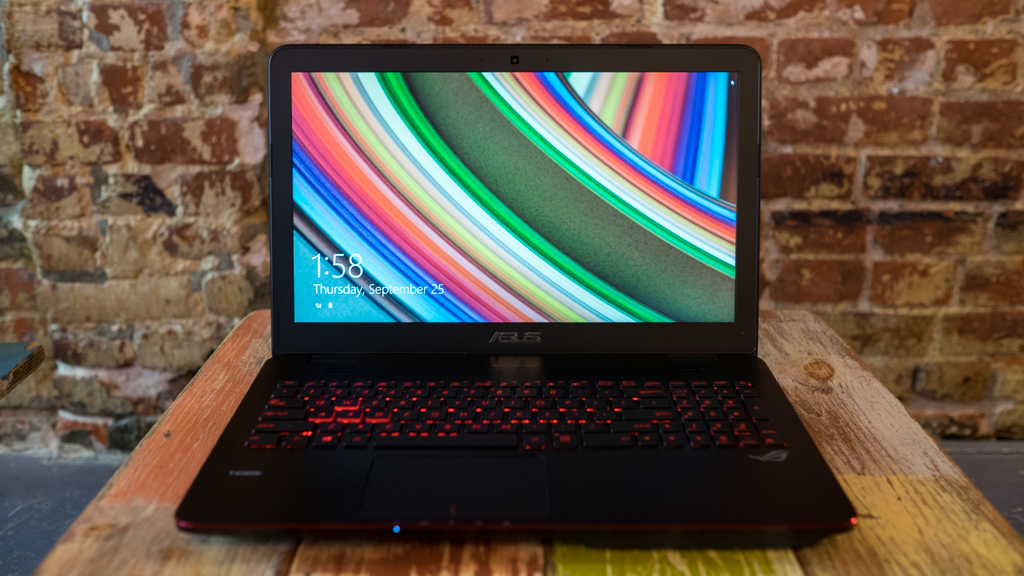Why you can trust TechRadar
Don't mistake the GL551's entry level price for middling performance. The affordable Asus machine packs a wallop. It easily plowed through any game I threw at it threw at it on medium to high settings.
You won't be able to turn on every graphical flourish – and forget about tessellation – but the GL551 has no problems playing recently-released games like Middle Earth: Shadow of Mordor. Here's how the Asus fared in our benchmark tests:
Benchmarks
- 3DMark: Ice Storm: 105,573; Cloud Gate: 15,736; Fire Strike: 3590
- Cinebench CPU: 602 points; Graphics: 89.36 fps,
- PCMark 8 (Home Test): 3040 points
- PCMark 8 Battery Life: 2 hours and 23 minutes
- Bioshock Infinite (1080p, Ultra): 40.55 fps; (1080p, Low): 126.55 fps
- Metro: Last Light (1080p, Ultra): 11.67 fps; (1080p, Low): 26.33 fps
Impressive results indeed, especially considering the GL551 is rocking the mid-range GTX 860M graphics card with 2GB of video memory. Despite this, the GL551 churned through 3DMark's GPU intensive benchmarks scoring 16,041 points in Cloud Gate and 3,590 points in Fire Strike.
Meanwhile, the Lenovo Y50 and its fully-loaded, 4GB GTX 860M completed the same tests with 13,639 and 3,650 points. Unsurprisingly the Maingear Pulse 14 performed the worst in this regard, finishing Cloud Gate with 12,603 points and Fire Strike with 3,363 points.
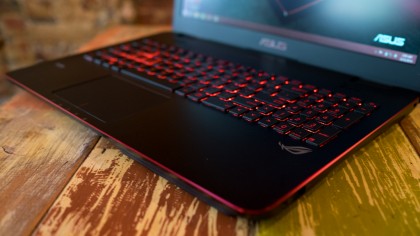
The most likely reason for the GL551's close – and at times leading – performance compared to the Lenovo is its slightly faster CPU (the Y50 we reviewed came with a tick slower 2.4GHz Core i7 processor). This is evidenced by the PCMark 8 test, where we can see the GL551 scored 3,040 points, a markedly better performance than Y50's 2,644 score.
However, it seems that having more video RAM is all too important when rendering games with more frames per second. Cinebench results show the Lenovo rig pulling ahead with 97 fps over the Asus's 89 fps.
When playing actual games, the Lenovo leads again playing Bioshock Infinite on its highest settings at 42 fps, while the GL551 trails close behind with 41 fps. Not a significant difference, but every little bit of gaming horsepower will matter more as developers push hardware even harder.
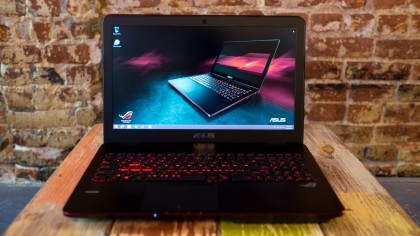
In between screen sheen and poor viewing angles
I was really hoping not to run into any caveats with the GL551, with its above average build quality and gaming performance. Sadly, though, Asus fell through one of the pitfalls that plagues many laptops, a poor display.
There are two things you'll notice about this machine's 15.6-inch panel. First the display isn't all that deep when it comes to contrast. Second, the matte finish on the screen causes light to refract across it entire surface, washing out anything on the display.
With these two problems combined, you will have a hard time figuring out the exact angle to tilt your screen. Any sunlight or illumination from an overhead lamp washes out the screen, desaturating colors and turning blacks into gray.
Thanks of this, you will have to tilt the screen carefully away from you, but pushing too far reveals the screen's poor viewing angles. It's a careful balance, and you'll have to figure out exactly how to position the GL551's display every time for the optimal picture.
The worse thing about the GL551 display is that, even after you've figured exactly how much to tilt the screen away from you, the picture still looks mediocre. The screen displays colors and blacks with a natural tone, but there's hardly any contrast. Dark areas within images render into black blotches, which could mean life or respawn in multiplayer games with enemy players lurking in the darkness.
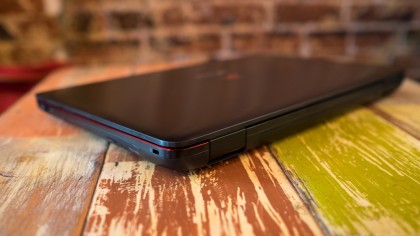
Another battery-guzzling gaming machine
It's pretty much a given that gaming laptops don't have very good battery life, and this Asus notebook does nothing to reverse this trend. This gaming laptop called it quits with the PCMark 8 battery test after 2 hours and 23 minutes, which falls in line with the Lenovo Y50's 2 hours and 49 minute result. The Maingear Pulse 14, by comparison, lasted a nearly identical 2 hours and 21 minutes.
The Asus GL551 lasted a slightly longer 3 hours and 35 minutes while tabbing between 15 webpages on Firefox plus another two in Chrome, streaming tunes on Google Music, watching Flashpoint Paradox for an hour and playing two bouts of Hearthstone. With regular use such as this, you can expect to get through part of the day unplugged, but be sure to pack the power adapter every day.
The Maingear Pulse 14 takes the cake when tasked with a similar load, hanging on for 4 hours and 2 minutes. Meanwhile, the Lenovo Y50 clocked out after just 2 hours and 45 minutes, much earlier than the rest of its competitors under similar conditions.
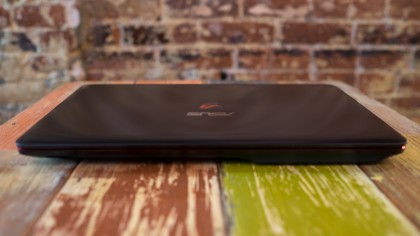
Bundled software
Asus has been known to put on an incredulous amount of bloatware on its notebooks, but thankfully, the company has scaled back on the amount of bundled software with its ROG line. Here are the most important bits you'll want to keep around:
- Asus Live Update: A simple download tool that pull the most up to date software for the GL551's pertinent system components.
- Asus WebStorage: 5GB of free cloud storage that, like Dropbox, you can place a shortcut to in Windows Explorer for easy access.
- Asus On-Screen Display: Activates more notifications when changing settings like the keyboard backlight level and turning on/off the touchpad. But why isn't this enabled by default?
- USB Charger Plus: Customize the way your USB ports provide power to charging devices, even when the laptop is asleep or off.
Kevin Lee was a former computing reporter at TechRadar. Kevin is now the SEO Updates Editor at IGN based in New York. He handles all of the best of tech buying guides while also dipping his hand in the entertainment and games evergreen content. Kevin has over eight years of experience in the tech and games publications with previous bylines at Polygon, PC World, and more. Outside of work, Kevin is major movie buff of cult and bad films. He also regularly plays flight & space sim and racing games. IRL he's a fan of archery, axe throwing, and board games.
